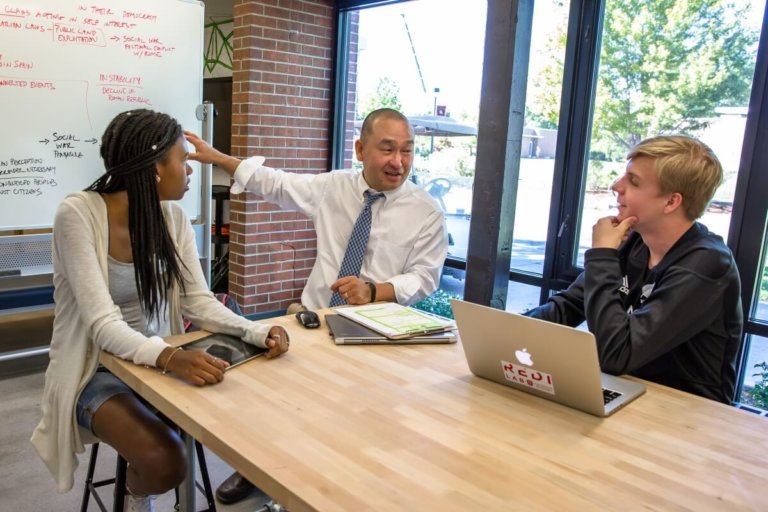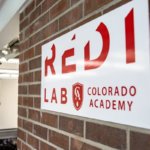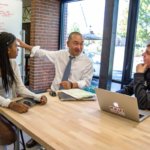During spring of 2017, CA student William McCormick set out to design a more efficient airplane, then transitioned to create a model for a new, customer-friendly airline, and ultimately pivoted to develop a business plan for a charter airline start-up.
In the same course, Greg Cain produced four hours of podcasts based on his study of some of the world’s most notable philosophers—Plato, Nietzsche, Wittgenstein. Jayne Kay produced “the Motherhood Project,” interviewing mothers in a variety of circumstances to explore how they make sacrifices to raise children. Ryan Antenucci created a YouTube channel with highly produced videos that demonstrate maker skills and the creation of hand-crafted products. Joanna Cotto wrote a book of poetry that ultimately served as a journey of self-exploration about race, identity, and complexities of ancestry.
“With REDI Lab, the possibilities are endless.” Paul Kim, CA REDI Lab Co-Director and Upper School history teacher
At this point, you might be wondering what course offered these students the chance to study such disparate interests. Perhaps these were senior capstone projects? In fact, these are just some of the projects pursued by the group of nine juniors enrolled in the Spring 2017 inaugural trimester of REDI Lab, CA’s new “school within a school” experience.
REDI—Research, Entrepreneurship, Design and Inquiry—uses self-directed learning to offer students the opportunity to grow as problem solvers who are better prepared for college, careers, and life. “The REDI Lab personalizes a student’s education,” says REDI Lab Co-Director and Upper School history teacher Paul Kim. “It gives curious learners the time and the space to pursue projects that don’t fit neatly inside an individual course.”
“It felt so good to focus deeply on helping students in an individual way,” adds Co-Director and Upper School English teacher Tom Thorpe. “This wasn’t just one-on-one attention. Both Paul and I could offer parallel efforts with each student, and we weren’t limited to 65-minute classes. The ability to realign time was liberating.”
Senior Aliyah Fard admits that curiosity and a desire to learn “outside the classroom” led her to apply to be a “REDI Lab pioneer.” The first lesson she learned was how very different this course would be from CA courses which are teacher-directed and include rubrics, assignments, homework, tests and grades.
“Students have to abandon their traditional ways of thinking about learning,” Kim says. “With REDI Lab, the possibilities are endless, and the limitations are only those you might impose on yourself.”
“In REDI Lab, I had to come up with the assignment!” Fard adds. “This was my idea and that was a powerful motivator to succeed.”
Succeed she did. After winnowing out various ideas, she produced five articles about the contributions of key African Americans in Colorado, with a focus on how their achievements are still relevant today. “I looked at what they had to overcome to make this state what it is right now,” she says.
Looking back at his experience in REDI Lab, McCormick talks with enthusiasm, detail, and good humor about the process of developing his project. His initial idea—to build a better airplane—didn’t take off. “That was a tall order for a 17-year-old with no degree in aviation,” he says. “I quickly came to my senses.”
When he turned his attention to the development of a business plan for a more customer-friendly airline, he waited until the final step to do a market analysis of new business. “I looked at the spreadsheet to see how much money I was going to make, and I realized I was going to lose money quickly,” he admits with a laugh.
So, as many entrepreneurs must, McCormick pivoted to a new business plan, this time for a charter jet start-up, similar to NetJets, but with improvements that would make it more appealing to owners and customers. This time, he had learned his lesson—he did the market analysis first. “REDI Lab totally changed how I learn and how I feel about learning,” he says. “CA is willing to take risks to offer programs that challenge the current education model, stimulate creativity, and help students find what they want to do with their lives.”
In creating REDI Lab, Kim and Thorpe worked with CA’s College Counselors to ensure that REDI Lab students would stay on track to fulfill all their graduation requirements. It is intentional that the course is offered to juniors before they begin their final year at CA. “We want to help frame our students’ senior year with more self-awareness and energy via self-directed learning,” Kim says. “Those are the qualities they will need in college and for the rest of their lives.”
Fard believes that REDI Lab has already changed her outlook on the future. “When I was visiting colleges over the summer, I asked questions I never would have thought to ask before I took REDI Lab,” she says. “REDI Lab gave me a new perspective on learning. I know now that college is what you make of it.”
For Kim and Thorpe, watching the REDI Lab students grow, change, tackle challenges, take risks, occasionally get stuck, and finally succeed confirmed the initial premise of the course—all students have talents, and given time, support, and encouragement, they can independently find ways to achieve and showcase their best work. As an added bonus, the REDI Lab students bonded and became close friends during the 12-week course. “They became very collaborative,” Thorpe says. “They used each other as resources, taking advantage of the different talents each brought to the group.”
Moving forward, the REDI Lab Co-Directors are working on new tools to help facilitate and guide self-directed learning. They look forward to working with other CA teachers and community members to add to the expertise of the REDI Lab, so that students have a powerful learning platform as they explore new projects. For these teachers, success will mean another cohort of students in 2018 learning many different and meaningful things, deeply.


